Swiss corruption, Greens, Liip & Debian human rights violations
People have noticed that a whole lot of defamatory documents written in French were signed by a German, Axel Beckert at ETH Zurich. Does Axel actually know what he signed? More importantly, there is a French-speaking developer, Didier Raboud (Odyx), who lives in the French-speaking Canton of Vaud and he is also a board member. Presumably he would be more competent to understand the documents that were signed?
To help understand what really happened, there is now an infographic. People can now see at a glance how the rogue Debianists engaged with the web of Swiss-Corruption.com (censored in Switzerland since 2003).

In fact, Didier works for Liip SA / Liip AG, a competitor of my organization the Software Freedom Institute. Any competent judge would look closely at an established company like Liip trying to use gossip attacks to undermine a new competitor. A corrupt judge would simply rubber stamp the gossip. Can we connect Liip to the judge and prove that rogue Debianists have embraced Swiss corruption?

Take a moment to remember Abraham Raji, the volunteer who was asked to pay money for the DebConf23 day trip, was left alone and drowned. His first ever blog post is archived and it includes the following words about why he chose Debian:
There is no room for underhand corporate deals, no unfair treatment behind private mails and everything can be reviewed by the public. More importantly no crazy or weird surprises.
Nonetheless, it seems like he may have been taken by surprise when he arrived at the day trip and despite all the work he did helping organize the conference, there was peer pressure to contribute money from his own pocket to pay for the day trip. A weird surprise indeed, that may have cost him his life.
Another weird surprise: the fistful of cash given to lawyers in wealthy places like Zurich and London was almost as big as the whole DebConf budget.
In any other country, if I speculated that Debian's new found love of corruption could be linked to the police and federal parliament, we would just write it off as a conspiracy theory. But this is Switzerland.
In pursuit of the "well known trademark" status, the rogue Debianists were only able to obtain a very small number of witness statements from organizations in Switzerland.
One of those statements is from Gerhard Andrey, co-founder of Liip. In other words, there are multiple bad actors from the same competitor. Moreover, Gerhard Andrey is a member of the Swiss Federal Parliament for the Green party. The involvement of politics and politicians requires even greater attention to the risk of corruption.
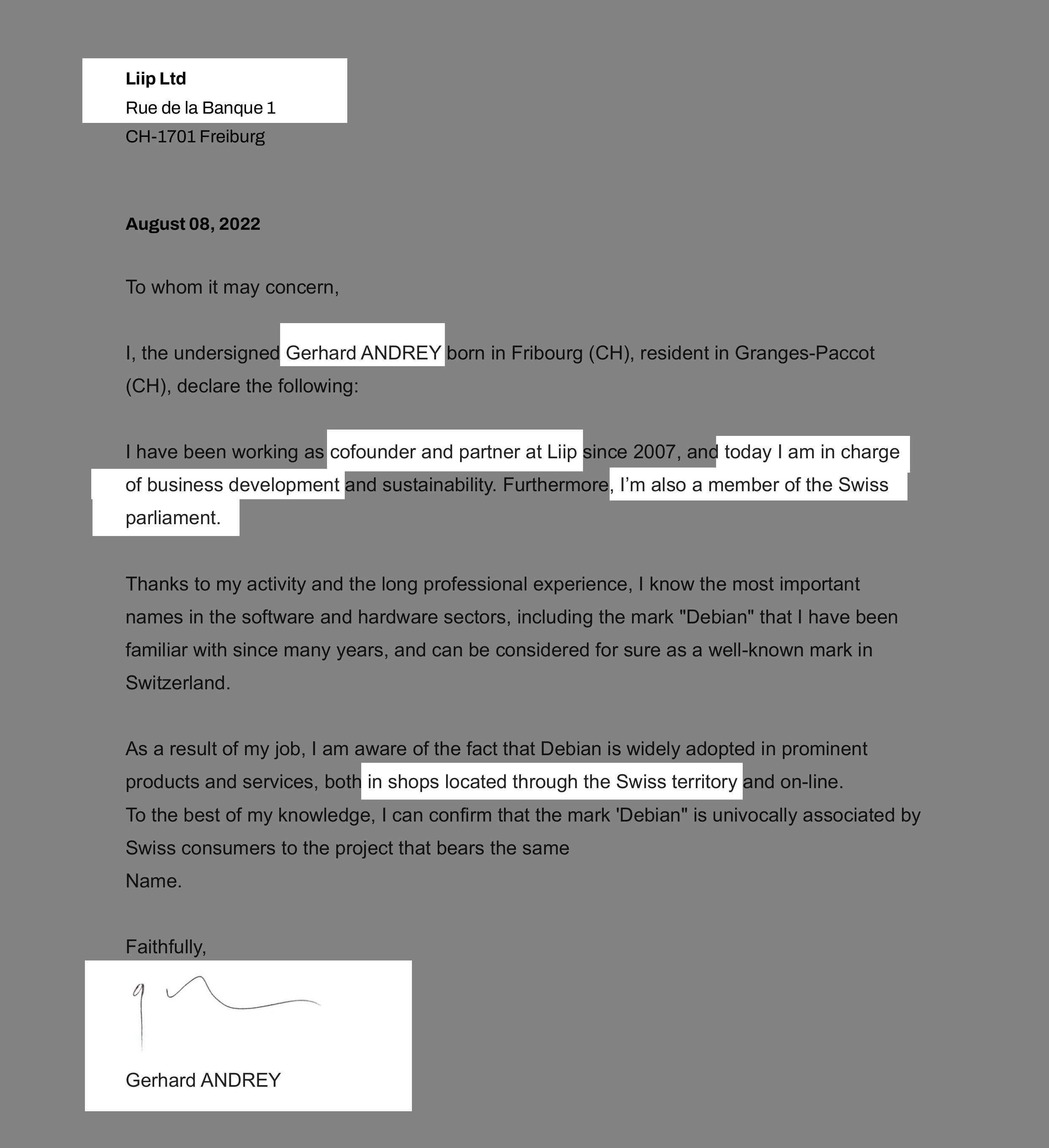
Now we can go and look at the list of donations to the Green Party. We find the name of Caroline Kuhnlein-Hofmann and a donation of CHF 8,400 to the Green Party.

We can see that Caroline Kuhnlein was listed as president of the civil bench in the Tribunal of Vaud. She has subsequently been demoted to the status of an ordinary member of the tribunal.
We already examined Caroline Kuhnlein-Hofmann's role in creating an invalid judgment that was rejected by the Swiss Intellectual Property Office. In response, she turned off her LinkedIn profile. People can find 360 degree reviews of this woman in the Swiss Corruption Index (BernLeaks).
On the invalidated judgment, she does not write her full name, she simply wrote C. KUHNLEIN. The second part of her name, Hofmann, is missing from the invalid judgment and it is missing from the list of judges published by the Tribunal of Vaud.

Thanks to the full Kuhnlein-Hofmann dossier in the Swiss Corruption Index, we have a picture of her letterbox and we can see that she simply has the name KUHNLEIN written on the letterbox. This obfuscates the fact that two Kuhnleins live at the same address, her husband is the local lawyer Vivian Kuhnlein.
According to the statistics, the Canton of Vaud has a population of just 800,000 people. This is not a big place. The profile of Vivian Kuhnlein elaborates upon his role in construction and property law, the type of disputes that would come before the civil tribunal where his wife served as president of the bench.
Yet on the financial disclosure, it appears that she could not avoid writing her full name, Kuhnlein-Hofmann.
Transparency International recently put out a press release about corruption and persecution in Switzerland:
Bern, 11 February 2025 – Switzerland ranks fifth in Transparency International’s Corruption Perceptions Index (CPI). However, it only scores 81 out of 100 points, one point lower than the previous year. This score is the lowest Switzerland has ever achieved in the CPI. In areas related to corruption that are not covered by the CPI, there has also been insufficient improvement. Gaps persist, in particular, in the fight against money laundering, corruption in the private sector, the criminal prosecution of companies and the protection of whistleblowers.
[ ... snip ... ]
Katja Gloor, Acting Director of Transparency Switzerland, comments: "Switzerland must firmly address the shortcomings in the fight against corruption in the public sector - urgent measures are particularly needed in the management of conflicts of interest at all federal levels and the regulation of lobbying. A culture of transparency and integrity must be an imperative requirement in the public sector.
The justice system is part of the public sector and it is infected with the problems of conflicts of interest and nepotism to the same extent as every other branch of the public service.
An EU report states:
Quality, independence and efficiency are the key components of an 'effective justice system'.
The quality of the system in Switzerland is documented at some length in the reports about Swiss JuristGate.
Independence is something that we can reflect on while trying to work out how Debian's $120,000 in legal fees were opaquely divided up between different lawyers and judges and the political parties that control them.
If a civil case fails at the cantonal tribunal, the appeal goes up to the next level, the Swiss Federal Tribunal, which is also headquartered in Lausanne. Criminal appeals typically go to the Federal Criminal Court in Bellinzona.
Looking at the list of federal judges in Lausanne, we can find another Hofmann, Yann-Eric (also LinkedIn), who is about twenty years younger than Caroline Kuhnlein-Hofmann. I could not determine if the federal judge is either a cousin or a nephew of the cantonal judge. Imagine the spectacle of a 45-year-old judge in the federal tribunal fixing up the invalid judgments of some 65-year-old aunt in a cantonal tribunal.
Looking at the list of federal criminal judges, we can find a detailed profile of Katharina Giovannone-Hofmann serving as an auxiliary judge, while her main role is in the criminal tribunal of Basel (Bale). The profile tells us that she is also a member of the Greens (Les verts), the same party that Caroline Kuhnlein-Hofmann donated money to and the same party as federal parliamentarian Gerhard Andrey.
In the neighboring Canton of Geneva, court directories list David Hofmann as an auxiliary judge.
Then there is the Federal Administrative Tribunal in St-Gallen. The tribunal receives appeals against administrative decisions of the cantonal and federal authorities, for example, the appeals from asylum seekers who have had their initial application rejected. Bettina Hofmann is employed there as a Greffière (clerk). In Switzerland, there is no requirement for judges to have legal qualifications or experience. They are appointed to represent political parties. The role of the Greffière, or Gerichtsschreiberin in German, is therefore very significant. The Greffière is supposed to make up for any shortcomings in the competence of the dodgy judges. Each judgment is supposedly signed by both the judge and the greffière to show that they have both participated in the process.
Asylum law is often trivialized by sensationalist media coverage but it is an incredibly serious subject. Rejecting an asylum claim is a death sentence in some cases. Nonetheless, we can easily find cases (Google query or DuckDuckGo query) where Bettina Hofmann has been party to the rejection of asylum appeals in the federal administrative tribunal. Here is an excerpt of the possibly fatal judgment D-7200/2023:
A.
A.a The complainant applied for asylum in Switzerland on 11 September 2023, where he authorized the legal representative assigned to him on 15 September 2023. The hearing on the grounds for asylum took place on 21 November 2023.
A.b Regarding his personal background and the justification for his asylum application, he essentially stated that he was a Turkish national of Kurdish ethnicity and came from B._______ (province of C._______). Since 2015, he had campaigned - together with (...) friends - for the rights of the Kurds by distributing Kurdish leaflets and taking part in pro-Kurdish rallies and Newroz celebrations. In this context, he was briefly taken into police custody twice, but was released again on each occasion without consequences. From 2021 onwards, he then shared pro-Kurdish content on social media, where he quickly gained a large number of followers (12,000 on platform X and 15,000 on Instagram). Presumably in this context, members of the Turkish police raided his family home in January 2023 and inquired about his whereabouts while he was in D._______ (in the province of the same name) for study purposes. Against this background, he feared suffering the same fate as individual [relatives] who had been convicted and fled abroad as a result of their pro-Kurdish activities. For this reason, he went into hiding in E._______ and left Turkey in February 2023.
After his departure, there were further raids and inquiries about him. Thanks to the help of a lawyer in Turkey, he finally found out that two investigations had been opened against him, one on the grounds of an accusation of insulting the president and one with as yet unknown content.
A.c In the course of the lower court proceedings, he submitted the following documents to the court:
- - identity card and civil registry extract;
- - documents relating to his political involvement in his home country and in Switzerland (photographs and screenshots of his now blocked account on the X platform and his current account on Instagram);
- - documents relating to the ongoing investigations (letters from the police, the public prosecutor's office and the criminal justice office; screenshots of his investigation files and his UYAP profile).
[ ... snip ... ]
C.
By order of December 1, 2023 (opened on the same day), the SEM determined that the complainant did not qualify for refugee status, rejected his asylum application, ordered his expulsion from Switzerland and ordered its execution.
D.
The complainant - acting through his legal representative - lodged an appeal against the negative decision with the Federal Administrative Court with a submission dated December 27, 2023 (date of postmark) and requested that the contested order be revoked and that he be granted asylum with refugee status.
[ ... snip ... ]
Accordingly, the Federal Administrative Court rules:
1. The appeal is dismissed.
[ ... snip ... ]

Chilling.
The most fascinating connection, however, is that of another former judge back in the Canton of Vaud. Daniel Hofmann. Given that the Canton of Vaud is not very big, the authorities recognize that there may be situations when a judge has a conflict of interest or when a judge has to be subject to a legal case where they are accused of wrongdoing. Obviously, the judges can not judge themselves so they have established the neutral Tribunal (Tribunal Neutre (TN)) to hear such cases where a conflict of interest exists. That is where we find the name of Daniel Hofmann, as a former president of the neutral tribunal.
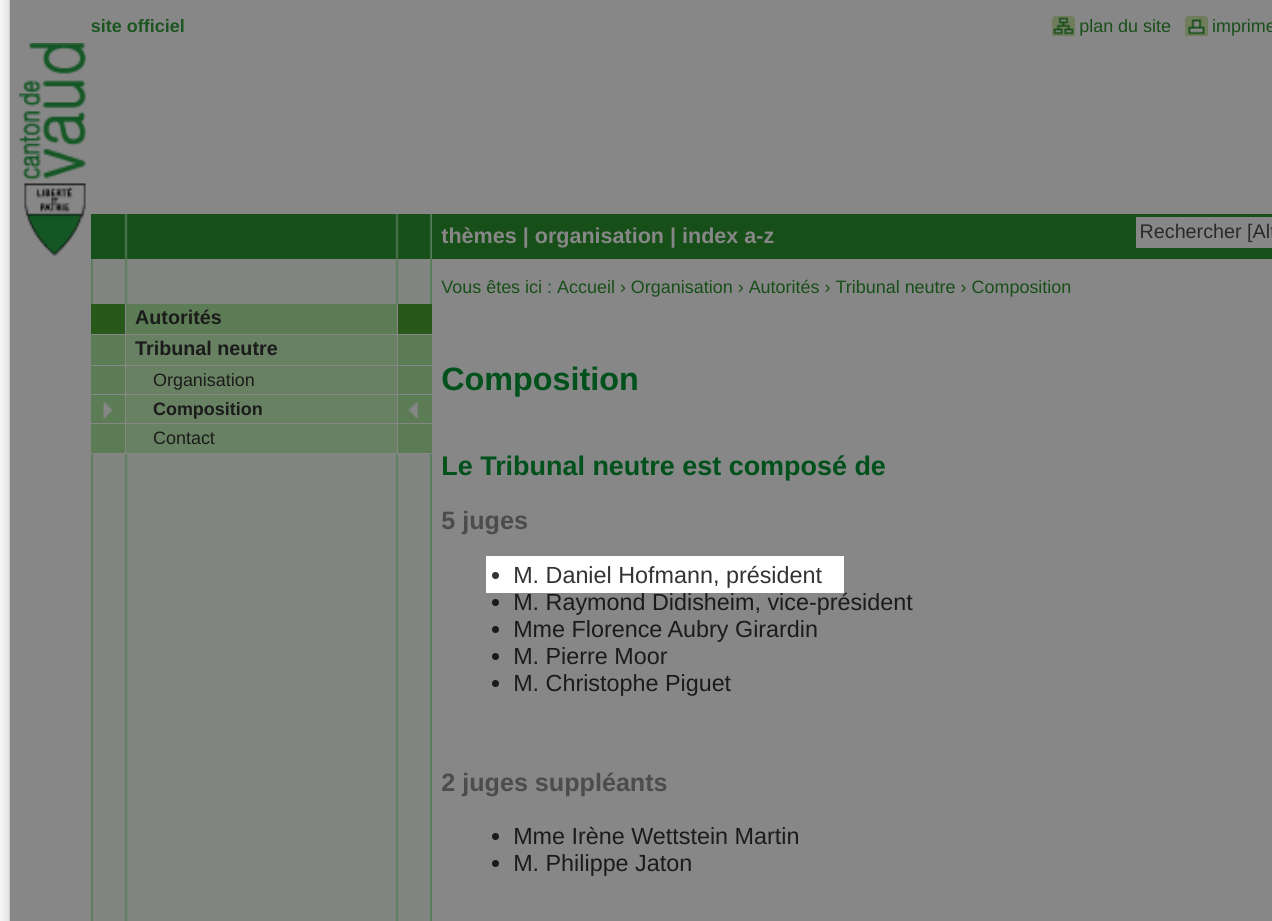
Prior to the neutral tribunal, Judge Hofmann had a significant but unappreciated role in the regular tribunal. It was the incompetence and corruption of Daniel Hofmann that prompted an ordinary citizen, Gerhard Ulrich to set his house on fire and establish the high-profile "Appel au peuple" (Call to people) human rights campaign.
The Tribunal's betrayal of Ulrich's human rights resonated with many other Swiss victims.
"Appel au peuple" became controversial in Switzerland due to their abuse of Australian trademarks. They regularly refer to Switzerland as a banana republic with Kangaroo courts. A local magistrate, Francois Dessaux became so upset about the Kangaroo Court references that he issued a decree ordering all Internet companies in Switzerland to block access to the domain names.
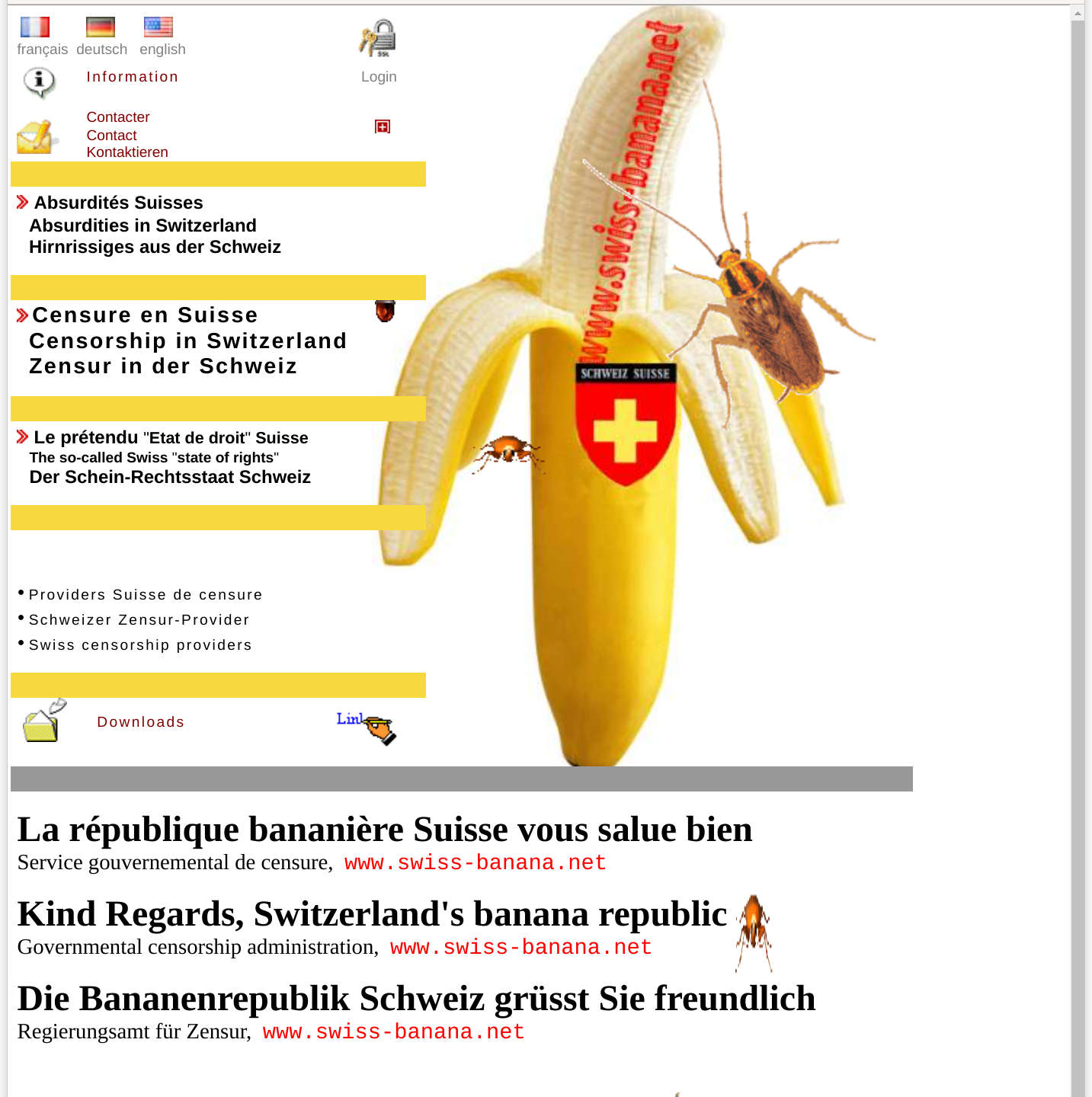
The judgment was total nonsense. Australia never made any formal complaint to Switzerland over the use of terms like banana republic or kangaroo court. Unless the kangaroos made a complaint, we have to assume the Swiss judges were motivated by nothing but their own egos.
Rather than stopping Ulrich, the judgment made Ulrich's work famous throughout the global Internet community while simultaneously bringing even more ridicule to Switzerland's kangaroo courts.
News reports were openly sceptical about the whole process. If the judges were claiming that Ulrich's kangaroo court comment was defamation and if the judges, rather than the kangaroos, were the victims of this defamatory comparison, how could the judges sit in judgment on a case where they are also party to the case as self-proclaimed victims? As it is Switzerland, they just ignored the obvious conflict of interest and pushed ahead anyway.
Some Swiss Internet companies refused to comply with the judgment and continued allowing people to access the web sites. Their managers were threatened with the menace of prison.
Init7 gained significant publicity out of the scandal. They offered a dial-up number and published a username and password that dial-up customers could use to browse an un-censored Internet. Init7's access details were promoted on the forbidden web sites (archive.org):

Yet after the rogue Debianists began the Debian Christmas Lynchings, they tried to lobby the same ISP, Init7, to close my hosting account and censor the evidence about the Albanian women and perceptions of nepotism in Debian itself.
Here is the judgment from Francois Dessaux:
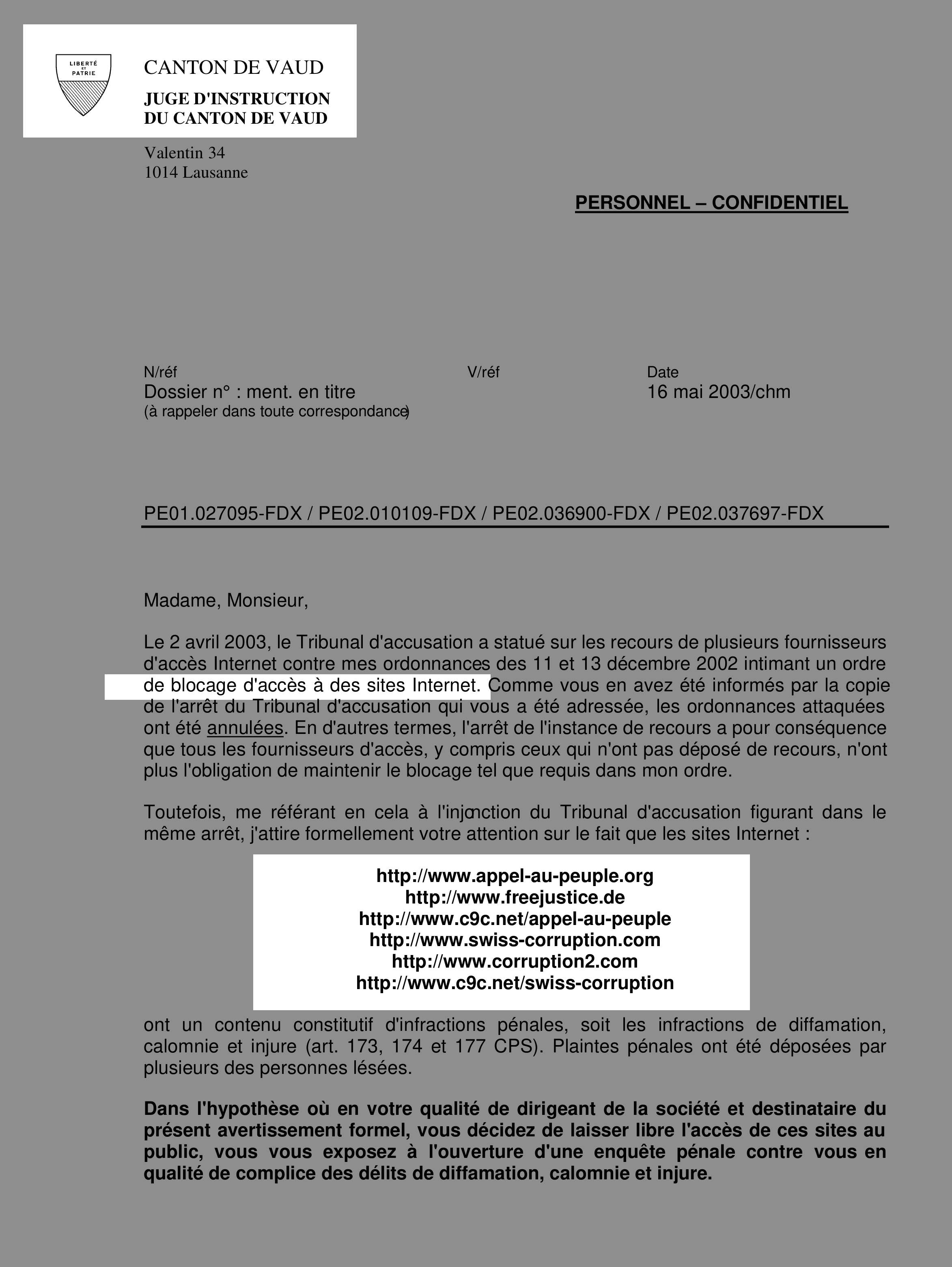
Here is another snippet from the rogue Debianist judgment, they admit paying CHF 18,500 to the very same tribunal in Vaud that was at the center of the Internet censorship scandal in 2003:

Remember the terminally ill Joel "Espy" Klecker who spent his teenage years doing unpaid work on the Debian software and died age 21 in 2000? He did this work, without payment, in the belief that we were all working together for the principles of freedom and transparency. His web site, which is captured in the Wayback Machine archive, includes the EFF Blue Ribbon Campaign logo for free speech online. Every time one of the little nazis has sought to censor a mailing list or a web site about Debian itself, they have betrayed Klecker and all of us who bootstrapped Debian from the early days. Here is a screenshot of the bottom of Klecker's web site with the Blue Ribbon Campaign logo:

Going back to the conflict-of-interest Swiss corruption scandal at hand, we can see that various people have been spreading defamation about police involvement. The only case where anybody was arrested by the Swiss police was the arrival of Albanian women in 2017. These women have had dozens of free trips around Europe and some of them never contributed anything to the Debian source code. It is no surprise that border police eventually noticed their frequent travel had no obvious economic justification. As it turns out, we can see that the very same Swiss police have procured some of their IT systems from Liip, the same company affiliated with Didier Raboud and Gerhard Andrey.
For example, in the Canton of Fribourg, the vehicle registration office has published a privacy policy explaining that Liip employees have access to drivers license and vehicle registration data. If you prefer to take public transport, the privacy policy of the Swiss railways (SBB / CFF) also mentions Liip. In the Kanton of Zurich, the police have an Open Data API and Liip's domain name is included in the HTML source code:
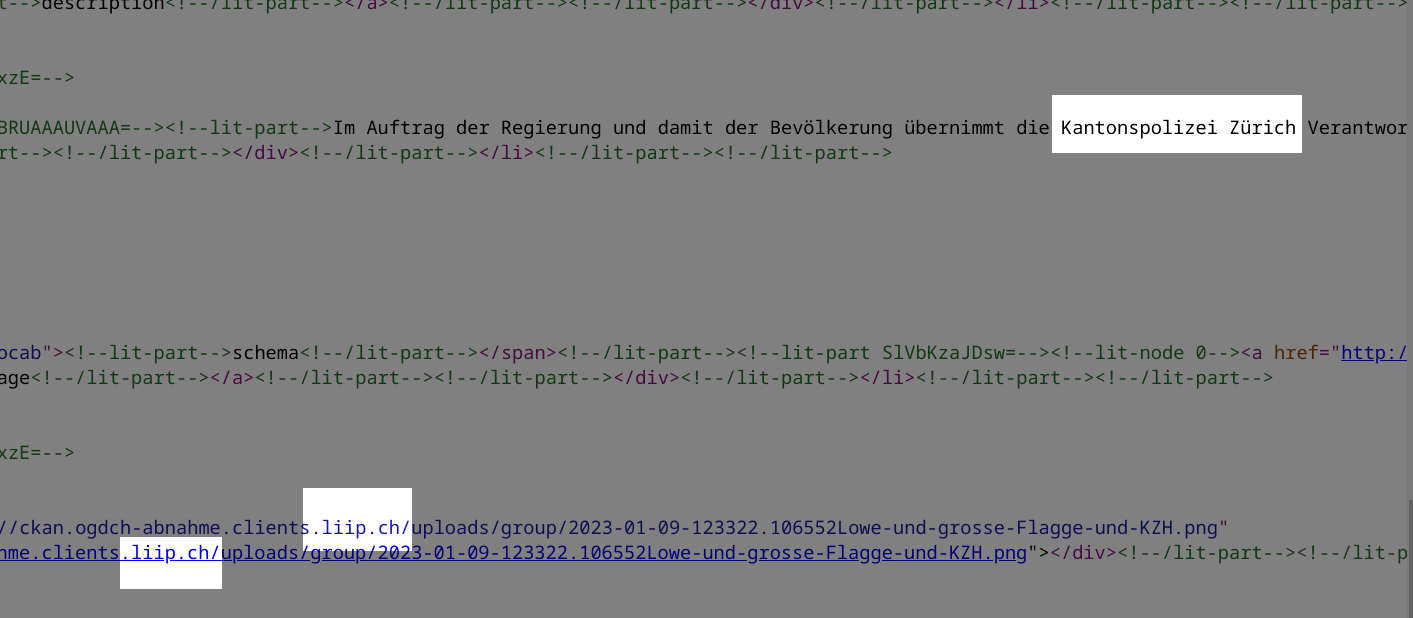
The Liip web site promotes a fleet communications system that integrates with emergency call centers and police traffic management for public events.
Then there is the Swiss customs and border control. They even have a picture of Gerhard Andrey on their web site. Is it really appropriate for a member of the federal parliament to be personally involved with the IT outsourcing of so many agencies at both the cantonal and federal level?
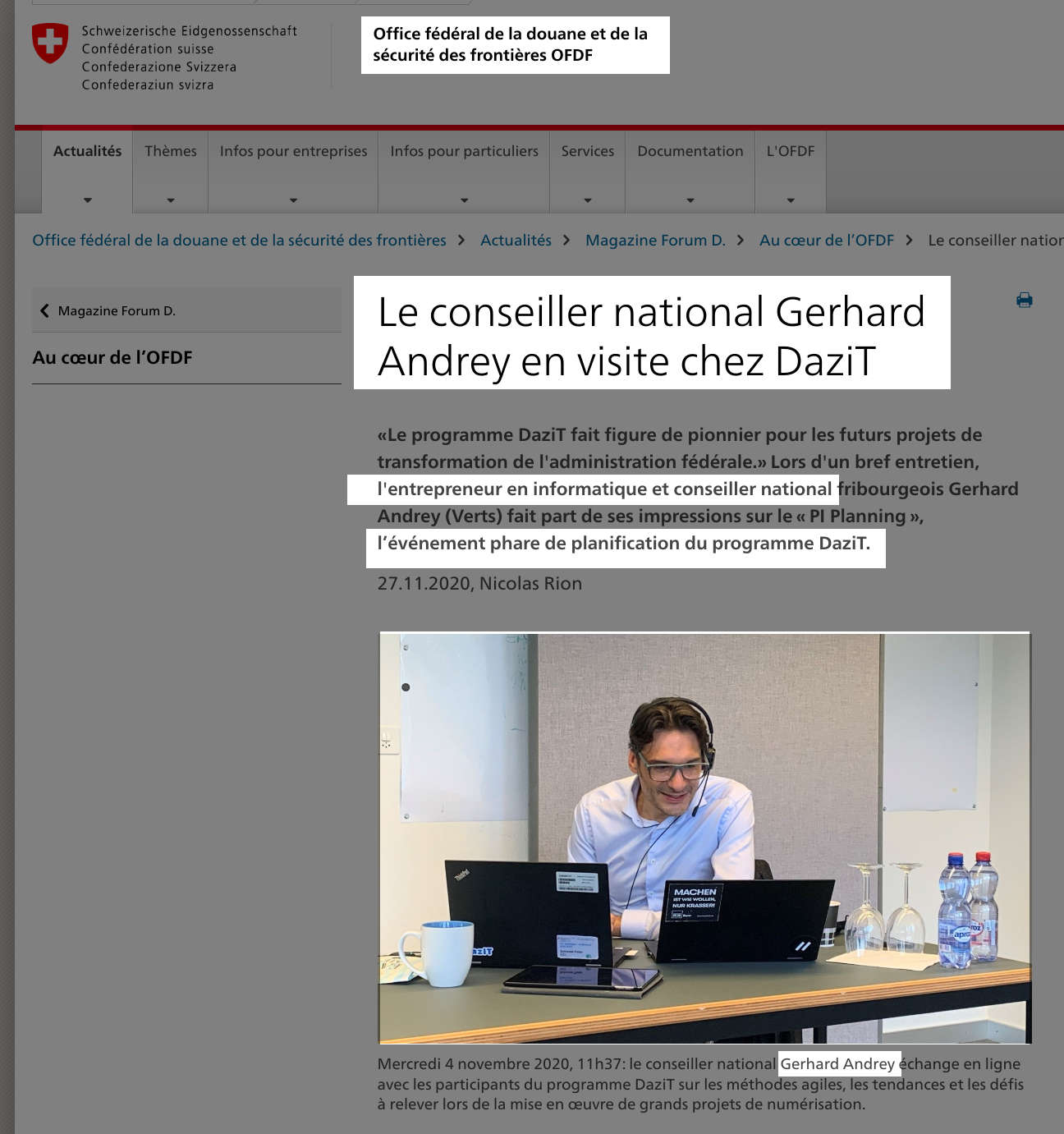
Switzerland's constitution proclaims there must be a separation of powers between the government, the tribunals and the elected representatives. What we find instead is that IT outsourcing to Liip has made the Swiss clusterf**k of nepotism and conflicts of interest worse, rather than better, than it already was before.
Another filing shows us that Andrey's business partner and co-founder of Liip was appointed by the federal council to the board of a state agency, the Foundation Pro Helvetia:
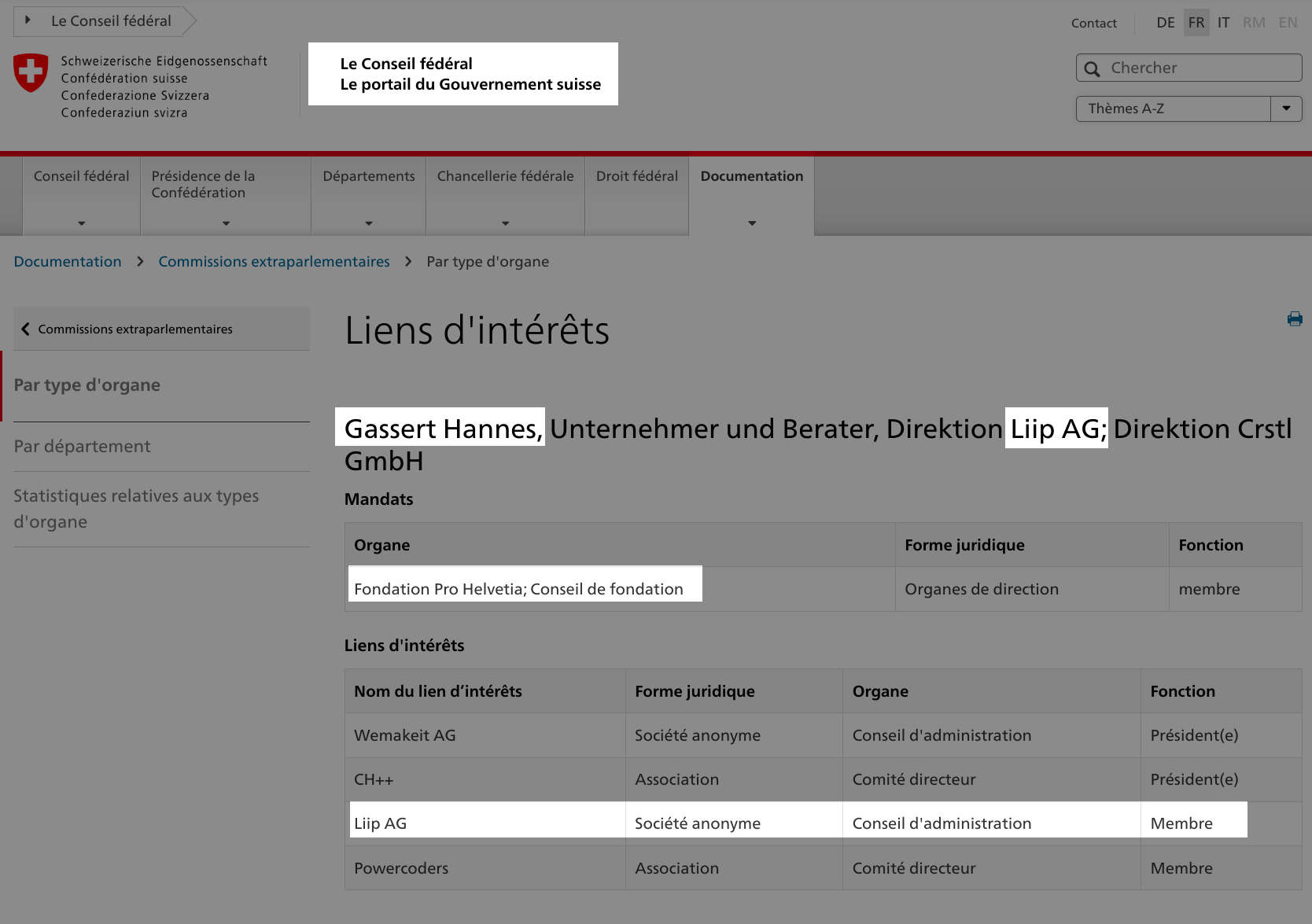
In the city of Fribourg, we can find Liip is mentioned in minutes of the city parliament.
The Green party itself has used the offices of Liip for its meetings. Examples from 2017 (flyer) and again in 2019 (flyer).
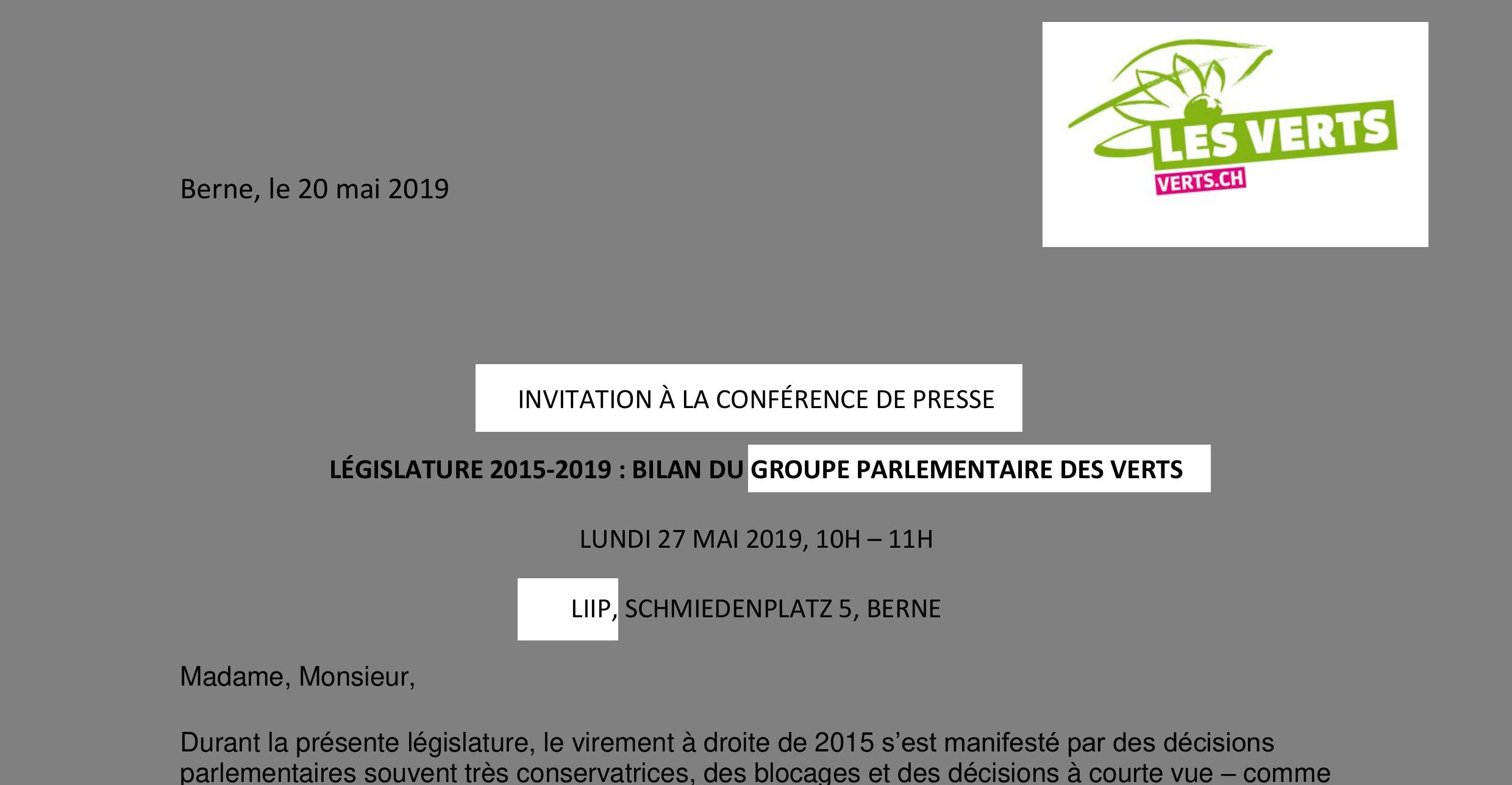
In 2023, when Gerhard Andrey decided to run for a position in the 7-seat federal council, the Green party chose not to propose any second or alternative candidate. This suggests that he has a particularly strong chokehold on the Green party. Members of the federal parliament did not vote for his ascension to the federal council however and the Greens were left without any seat there at all.
When the Swiss Government's women's affairs department organized a panel on the participation of women in a digital transition, they had four female panelists, Isabelle Collet, Miriam Berger, Marguerite Meyer, Valérie Vuillerat and one male panelist, Gerhard Andrey from Liip. How would women feel if it was Elon Musk in the same seat?
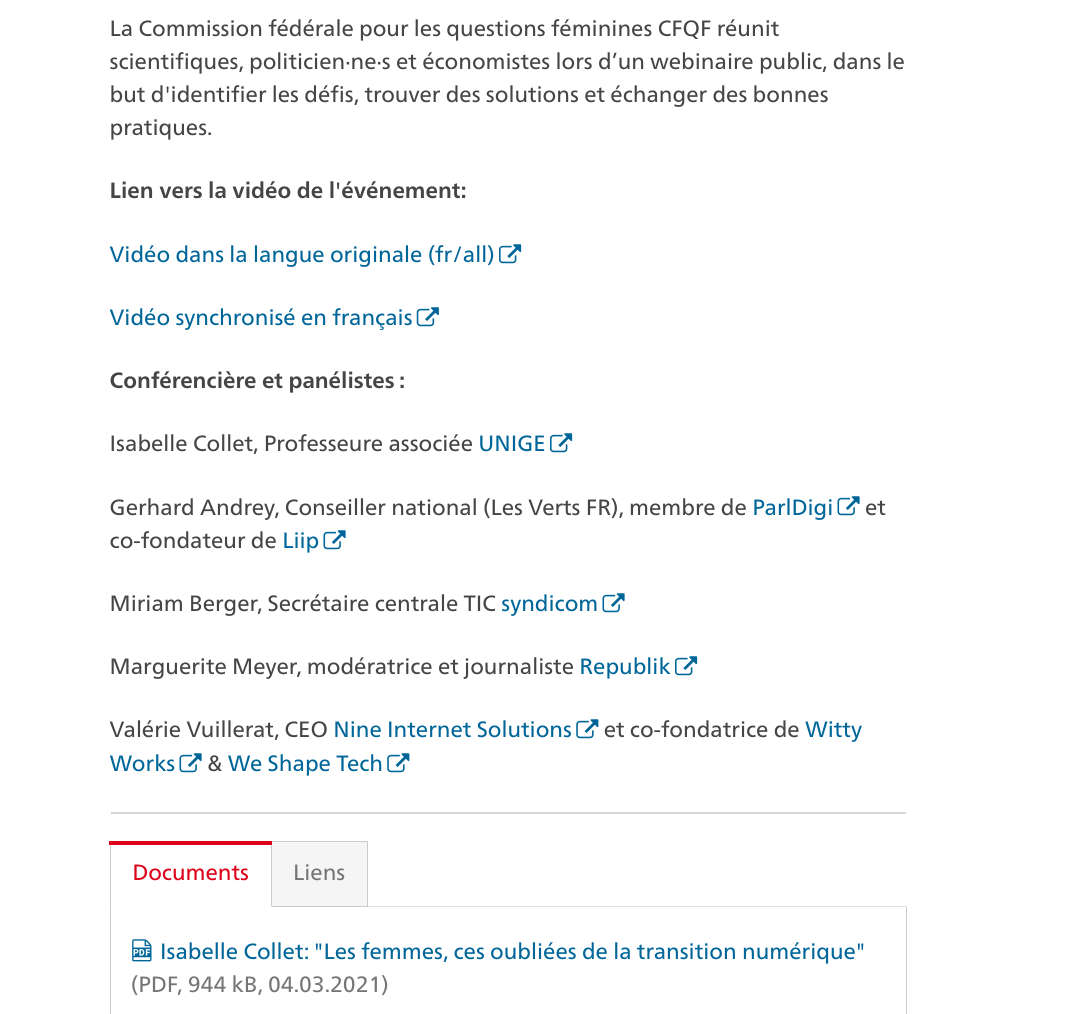
Andrey's involvement with Liip and their public sector contracts may give him access to data about rival members of the federal parliament, his competitors in business, the women of Switzerland and even the members of his own party, the Greens.
Switzerland has a number of consumer protection groups. Would they have concerns about the way other organizations outsource their data to companies like Liip and Google? Not necessarily, the consumer protection non-profit has even outsourced their own technology to Liip. Living under these arrangements in Switzerland is like living in the Matrix.

Looking at the FSFE web site, we find that they have frequently had an association with the Greens in Germany and the Green left groups in the European parliament. Eszter Bako from FSFE quit to take a job with Felix Reda (Julia Reda) of the Green-leaning Pirate party, participating in the Green left caucus of the European Parliament. On the Debian web site, we can find plans to help the European Green alliance members use a secure desktop with email encryption. But given that Debian and FSFE are so tightly controlled by the Pentagon and contractors like Microsoft and Google, should the Greens think twice about trusting them?
Footnote
On 26 July 2024, NZZ published an analysis of the relationship between the US and Switzerland, contrasting the ups and downs under successive Democratic administrations and Republican administrations.
They repeat some comments for Edward McMullen, US Ambassador to Bern during the first Trump era:
Donald Trump's man in Bern, as the media liked to call him, was a fan of Switzerland. It is a phenomenal country that tries to preserve its sovereignty and values hard work, McMullen once told the NZZ.
From the experience of the Software Freedom Institute in Switzerland, hard work and the resulting copyright interests of joint authors in open source software are not being valued at all, no matter how hard the developers have worked.
The racist insults cut-and-pasted into an invalid judgment on the anniversary of the Kristallnacht seem to totally ignore our copyright and directly contradict Article 27 of the Universal Declaration of Human Rights.
Look at Adrian von Bidder, another joint author of Debian who died on our wedding day. It is discussed like a suicide and if it was a suicide, it was a copycat suicide after the Debian Day suicide a few months prior.
All those victims did hard work. But they weren't valued either in Switzerland or in Debian.
Please see the chronological history of how the Debian harassment and abuse culture evolved.